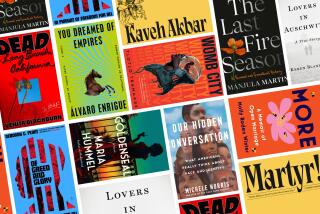BOOK REVIEW : West of Kabul, Wounded Before the War : AFGHANISTAN <i> by Alex Ullman</i> ; Ticknor & Fields; $19.95; 312 pages
- Share via
The part about never getting to Afghanistan? Right away I got that much of Alex Ullman’s joke in “Afghanistan,” his first novel.
This guy Patrick, maybe he can find his way around a glitzy New York fashion magazine, maybe he can survive his 20s in Manhattan, handle painful love affairs, gorgeous models, lines of coke, iced vodka and all, but Afghanistan would chew him right up.
Yet it is to Afghanistan he is headed, by way of Switzerland and a side trip into southern France, when he pauses in a Montreux train-station cafe to consider how he got where he is.
I somehow didn’t expect a 140-page digression. I didn’t expect to find myself reading on and on about a family of colorful yet remarkably unpleasant people, the Albers family: mother, brother Michael and sister Irina. It is to Irina that Patrick feels he must propose marriage. By the time he does, of course, she counter-proposes that they stop seeing each other.
This comes on the heels of the death of Irina’s beloved grandfather, a real character, a Russian intellectual named Kuratkin.
The central difference between Kuratkin and everyone else in this book: In his prime, Kuratkin had great stories to tell. The same can’t be said of ensuing generations. Patrick, in deciding to lick his love wounds by getting some real wounds in Afghanistan, actually is looking for stories of his own.
Ullman gives the reader an interesting twist, presumably drawing on his own background. Patrick is half-Swiss, just as Irina and Michael Albers are half-Russian and of an intellectual emigre stripe. So their combined experiences are of Europe as well as the United States. Even in this glorified age of cultural mongrelization, there is enough difference there that these people don’t really belong anywhere.
Patrick lives in New York, to be sure, makes love in New York, gets mugged in New York, but he isn’t from New York. He isn’t from Switzerland, either. Yet it is there, in the mountain-village playgrounds of the wealthy (of which class he is not a member, though his shoulders are well-rubbed), that he comes face-to-face with his youth and his dysfunctional family.
His past and future pass each other in one of those long Alpine tunnels. The Patrick who emerges from this book and tells the tale is not the same young man seen upon entering the book, and it is this transformation that the reader is encouraged to enjoy.
Ullman writes with controlled grace and wit. He pulls the reader into Patrick’s New York, then into Switzerland and France as well. He is a keen observer of foible and nuance and has the skills to breathe life into these observations:
“My only company in the cafe was a dough-faced man in a brown suit who had entered a few minutes after me, heaved a massive briefcase onto a chair, and called for un ballon d’rouge in a thick Vaudois accent, which had also been my father’s. While I examined him, wondering briefly whether he came from my father’s valley or another one nearby (he could have been a distant cousin of mine), he took a sip of wine, smacked his lips, and replaced the glass meticulously in the wet ring on the table. Then he removed his eyeglasses, pinched the bridge of his nose, cleaned the corners of his eyes, then finally rubbed his whole face with both hands, in a growing frenzy moaning softly behind them.”
But he also keeps an odd and, for me, disconcerting emotional distance. By the end of the book, the reader comes to understand that Patrick, having survived his madcap experiences of racing through France with Irina’s drug-addict brother on a mission to smuggle him into Switzerland, has corralled a story worth holding anyone’s attention, even in a crowded, noisy bar. If this is the point of life, how deep have we gone?
Somewhere in the process of observing and writing, Ullman took one big step backward, a step of emotional detachment. So I found my problem at the end of the book to be the same as it was when I began reading: Why should I care about this guy and his bad taste in girlfriends?
Or, stated differently, given the author’s obvious skill (and I look forward to more tales of the road), why didn’t he make me care?
Next: Christopher Goodrich reviews “You Gotta Play Hurt” by Dan Jenkins (Simon & Schuster).
More to Read
Sign up for our Book Club newsletter
Get the latest news, events and more from the Los Angeles Times Book Club, and help us get L.A. reading and talking.
You may occasionally receive promotional content from the Los Angeles Times.









